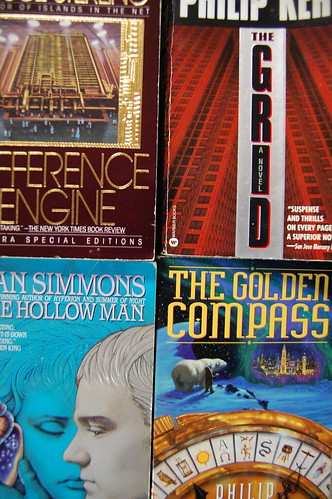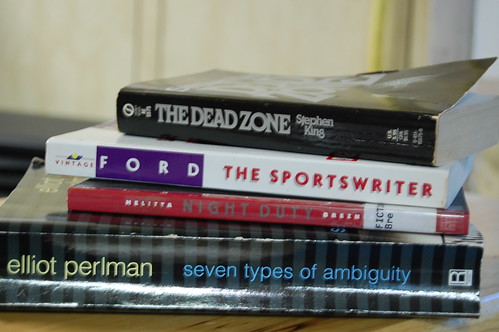 No one so far has wanted any of the books that have been eliminated. Did I scare you off? Just wondering.
No one so far has wanted any of the books that have been eliminated. Did I scare you off? Just wondering. I’ve really been falling behind on these posts for the Reading Elimination Tournament, and I just need to get Round 1 finished so we can move on to analyze the survivors and keep reading. So here is the latest round of reviews.
The Golden Compass – Philip Pullman (1995)
I’ve heard about this series for quite some time and been meaning to read them, and The Golden Compass does not disappoint you. Within the first five pages we're introduced to Lyra and her daemon who looks like a moth. We also have them sneaking into a forbidden room, almost getting caught, and witnessing a possible poisoning. The otherworldly feel of this book is amplified by little details such as the daemons. I like how this book starts out in the middle of the action and with a significant event within the first five pages. It sets up some elements of the fancy world and beckons you to read more about it. On to round two.
The Grid – Philip Kerr (1995)
The Grid has an interesting premise, a high-tech office tower that is completely run by computers, yet it turns bad and starts to kill people trapped inside. What's not to like about that? However, I have to make a decision based on the first five pages, and these pages seem to be laying out a lot of background which may or may not be necessary to get the book underway. The description is okay but we still have no idea who the protagonist might be, nor any foreshadowing of what is about to happen within the story and barely any dialogue at all. Although this book slides into one of my areas of interest: technology gone stark raving mad, I'm going to have to eliminate this one based on the content of the first five pages.
The Difference Engine – William Gibson and Bruce Sterling (1991)
This book is acknowledged as one of the pillars of the steampunk genre. Within the first five pages we are introduced to Sybil, a woman who appears to be a prostitute in an alternate Victorian England. In this reality computers have existed for a while and are used to research information about anyone. Although I don't typically enjoy the Victorian era setting in stories, the map in the front of the book showing the world of this 1855 (which looks a lot different than the actual world of 1855) is interesting. I'm sure this book needs a little more time to get started, and I'm intrigued to give it a chance. Round two for this one.
The Hollow Man – Dan Simmons (1992)
Dan Simmons is one of my favorite authors. In the first five pages we meet Bremen and his wife dying of cancer. They are both telepathic. He tries to fill her last night on earth with good memories via that link. She dies around page 5. This is a great way to hook a reader in. Needless to say, this one is one of the 32 to go to the next round.
Books Eliminated So Far (and available if you want them):
- 21 – Jeremy Iversen (2005)
- Farm Fatale – Wendy Holden (2001)
- Freezing -- Penelope Evans (1997)
- Stronghold: Dragonstar Book 1 – Melanie Rawn (1990)
- Man of the House – Stephen McCauley (1996)
- Strawberry Tattoo -- Lauren Henderson (1999)
- Lying Awake -- Mark Salzman (2000)
- The Feast of Love -- Charles Baxter (2000)
- Love Invents Us -- Amy Bloom (1997)
- Night Duty – Melitta Breznik (1999)
- The Grid -- Phillip Kerr (1995)
- Lord of Chaos (Wheel of Time Book 6) – Robert Jordan (1995)
- Crown of Swords (Wheel of Time Book 7) – Robert Jordan (1997)


